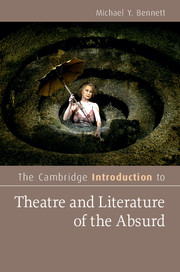Book contents
- Frontmatter
- Dedication
- Contents
- Acknowledgments
- Chapter 1 Introduction: Overview of the absurd
- Chapter 2 Setting the stage
- Chapter 3 The emergence of a “movement”: The historical and intellectual contexts
- Chapter 4 Samuel Beckett
- Chapter 5 Beckett's notable contemporaries
- Chapter 6 The European and American wave of absurdism
- Chapter 7 Post-absurdism?
- Chapter 8 Absurd criticism
- Notes
- Further reading
- Index
- Cambridge Introductions to …
Chapter 4 - Samuel Beckett
Published online by Cambridge University Press: 05 November 2015
- Frontmatter
- Dedication
- Contents
- Acknowledgments
- Chapter 1 Introduction: Overview of the absurd
- Chapter 2 Setting the stage
- Chapter 3 The emergence of a “movement”: The historical and intellectual contexts
- Chapter 4 Samuel Beckett
- Chapter 5 Beckett's notable contemporaries
- Chapter 6 The European and American wave of absurdism
- Chapter 7 Post-absurdism?
- Chapter 8 Absurd criticism
- Notes
- Further reading
- Index
- Cambridge Introductions to …
Summary
Samuel Barclay Beckett (1906–89) was born in the Dublin suburb of Foxrock, Ireland. Son of middle-class Protestant parents, Beckett attended Portora Royal School (where Oscar Wilde also went) and then Trinity College Dublin. After graduating, Beckett took lecturer posts at École Normale Supérieure and then back at Trinity College Dublin. Giving up his career in academia, and after being a part of the French Resistance in WWII, Beckett spent most of his adult life in Paris writing plays, short stories, novels, essays, and poetry. Best known for his play, Waiting for Godot, Beckett won the Nobel Prize in Literature in 1969. Samuel Beckett died in 1989.
One of the primary challenges in discussing a writer in relation to the absurd, as mentioned earlier, is that these writers associated with the absurd were not a part of a self-proclaimed movement; rather, the “movement” was thrust upon them as a somewhat after-the-fact categorization. The analysis of Samuel Beckett's work maybe most clearly typifies this conundrum for both the scholar and the student. Samuel Beckett is one of the most written about authors of the twentieth century. And while Beckett has been the poster boy of absurdism, and in some ways defines how the general public and academics alike understand absurdism, it must be stressed (and this cannot be overstated) that Beckett should not be (and is not) understood only through the lens of the absurd. The absurd is a catchall concept that functions almost as mental shorthand for connecting writers who, while doing some similar things, are also each creating their own literary paths. Therefore, it is vital to understand how Beckett does not just fit in with other absurdists, but transcends and departs from them. As such, it is worth noting that Beckett studies, especially in the last number of decades, has followed its own leads, not defaulting to Beckett as an absurdist to make sense of his work.
- Type
- Chapter
- Information
- Publisher: Cambridge University PressPrint publication year: 2015



